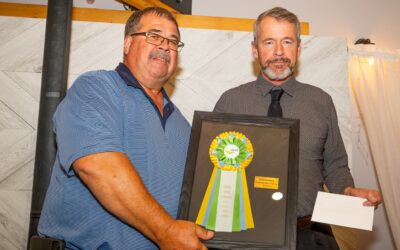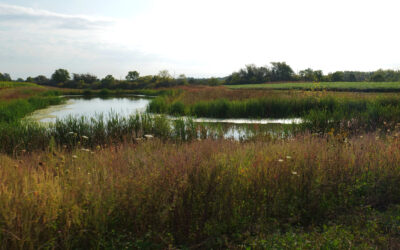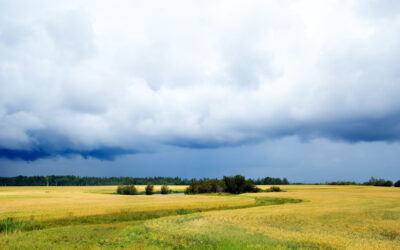ALUS Canada’s national field conference featured intensive training sessions and an excellent tour of ALUS Montérégie projects, including a return to the original site where ALUS celebrated its Quebec launch in 2016.
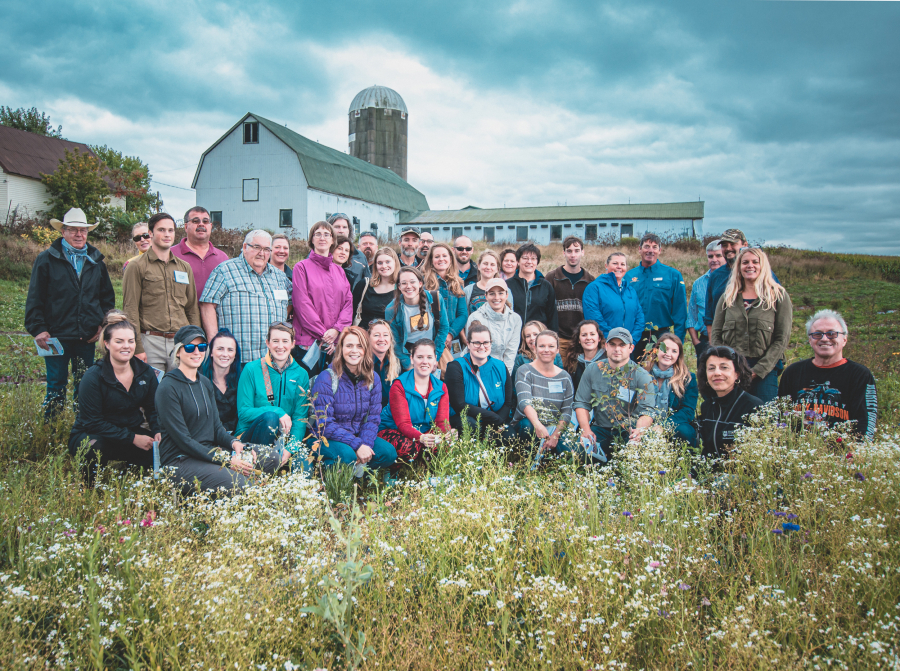
Representing 25 communities in six provinces, attendees at ALUS Canada’s national field conference enjoyed an excellent tour of ALUS Montérégie projects, where participating farmers explained why they work with ALUS to make environmental improvements on their land. Photo: Sophie Caron
More than 50 ALUS Program Coordinators, PAC members, participants and staff from 25 ALUS communities across Canada took part in this year’s national conference, held in Montérégie, Quebec, from September 23 to 25.
ALUS Canada’s national field conference featured intensive training and planning sessions, during which ALUS staff explored best practices for managing ALUS communities and implementing ALUS projects aimed at increasing biodiversity and wildlife habitat, protecting water from pesticide, nutrient and sediment accumulation, and sequestering carbon in the soil.
ALUS Montérégie Program Coordinator Yasmina Larbi-Youcef and her team also organized an excellent tour of local ALUS projects, where participating farmers explained why they opted to work with ALUS to make environmental improvements on their land. For this tour, the ALUS team was joined by a group of biologists and conservation specialists from Environment and Climate Change Canada’s Quebec City offices.
At Ferme Girolois in Ste-Brigide-d’Iberville, for example, ALUS participant Gilles Loiselle provided a guided tour of two ALUS projects, each just over one acre in size. The first was a 44 metre hedgerow, planted with native flowering shrubs, hardwoods and pines to give new purpose to an abandoned, steeply sloped farm field.
“The field was getting weedy, which I wasn’t very happy about,” said Loiselle. “Then I heard about the ALUS program. I met with their agronomist and we made a solid plan for the field. I prepared the land; they organized everything else.”
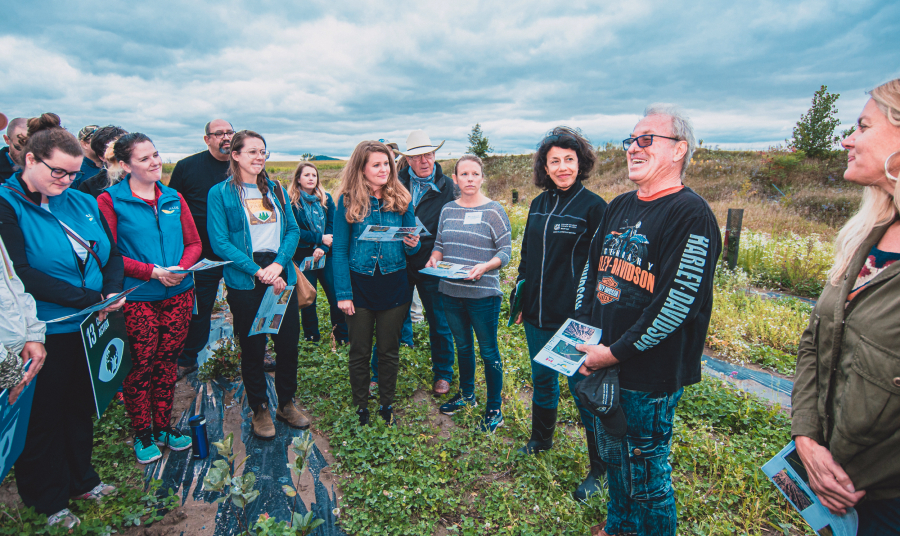
“The field was getting weedy, which I wasn’t very happy about. Then I heard about the ALUS program. I met with their agronomist and we made a solid plan for the field. I prepared the land; they organized everything else.” -ALUS participant Gilles Loiselle (of Ferme Girolois in Ste-Brigide-d’Iberville, Quebec) explains the inception of his ALUS project, a 44 metre hedgerow planted with native flowering shrubs, hardwoods and pines to give new purpose to an abandoned, steeply sloped farm field. Photo: Sophie Caron
Loiselle’s second ALUS project was a riparian area planted in 2018 with native flowers, berry shrubs and hardwood trees to provide wildlife habitat and capture water that would have run into the brook.
The second stop on the ALUS Montérégie tour was in Saint Mathias-sur-Richelieu, at Ferme Gestion Petit Manoir, a 2,000-acre farm where ALUS participant Olivier Martin grows field crops and raises 30,000 pigs per year. Martin showed the group three of his ALUS projects intended to produce ecosystem services to benefit the environment and the local community.
The first of Martin’s ALUS projects was a pond near the farmhouse which had been improved by establishing a buffer zone around it, planted with trees and edible fruit shrubs, and by enhancing the quality of wildlife habitat with bluebird and swallow nesting boxes and two sandy nesting sites for the pond’s resident snapping turtles.
The tour group then walked through a cultivated field, which had been sown in a cover crop of mustard, clover and ryegrass, to reach two ALUS projects along the Rivière des Hurons, an important River in the watershed of the same name which is home to five threatened species of fish including the Copper redhorse (Moxostoma hubbsi), a globally unique fish.
Martin explained that ALUS had performed significant work to help stop the erosion of the riverbank, including physical engineering around the field drain outlet, the installation of a double riparian windbreak hedge 180 metres in length and 8 metres wide, and the establishment of a flowering meadow for pollinators.
“Cover crops and green manures are very important for me,” said Martin, “but I also wanted to stop the riverbank from eroding under the ice every spring. It’s important to take care of the land for future generations. I don’t mind giving up a little bit of profit now if it means I can ensure my daughters will be able to carry on farming here in the future.”
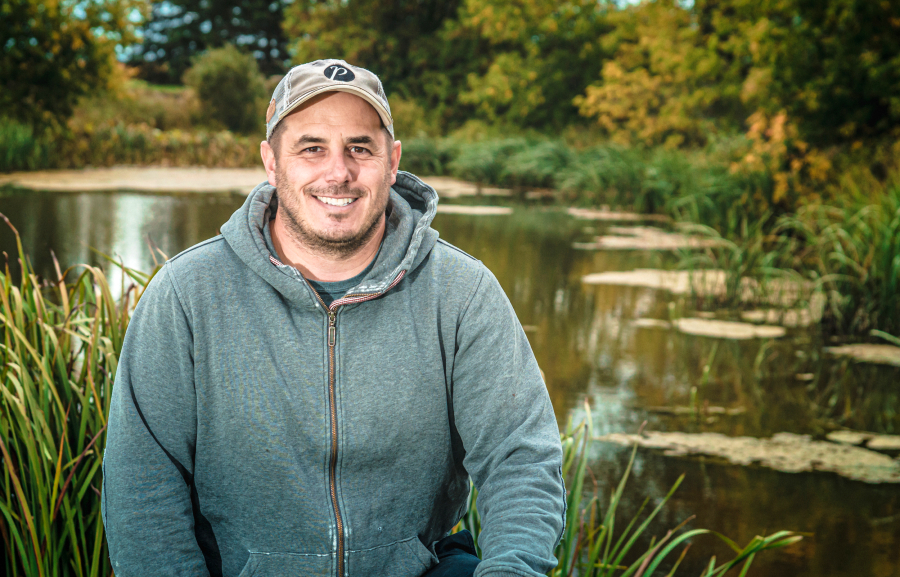
“It’s important to take care of the land for future generations. I don’t mind giving up a little bit of profit now if it means I can ensure my daughters will be able to carry on farming here in the future.” -ALUS participant Olivier Martin (Ferme Gestion Petit Manoir in Saint Mathias-sur-Richelieu, Quebec) posing in front of one of his ALUS projects, a deep buffer zone of native trees and berry shrubs, with bluebird and swallow nesting boxes and nesting sites for the pond’s resident snapping turtles. Photo: Sophie Caron
The ALUS Montérégie team also guided the group to another nearby riverside project site. Given that Martin could not farm this two-acre parcel of land as he no longer had a right of way to access it, he opted to reforest the area through ALUS, planting 75 native trees of nine different species, with 150 native shrubs established between them. The maintenance simply involves keeping the grass down until the trees are well established.
The tour concluded with a triumphant return to the first ALUS project in Quebec, in Saint-Jean-Baptiste, where ALUS celebrated its big Quebec launch in 2016.
Three years later, it was wonderful to see how the woven willow fencing along the inside of the stream bank had flourished into a row of resilient, lush foliage, effectively preventing soil erosion and producing cleaner water for the downstream community. What’s more, the triple-row riparian hedge of native trees and shrubs had grown significantly taller and was laden with chokecherries and elderberries for birds, wildlife and the visiting ALUS staffers.
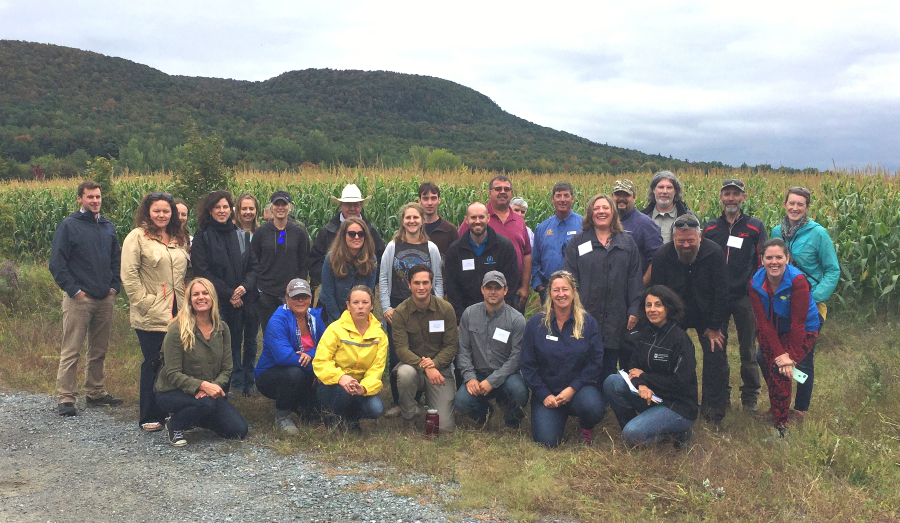
Back to where it all began: The tour concluded with a triumphant return to the first ALUS project in Quebec, in Saint-Jean-Baptiste, where ALUS celebrated its Quebec launch in 2016.
All the sites featured on the ALUS Montérégie tour were prime examples of successfully integrating wetlands, riparian zones and native trees and shrubs into active, profitable farms.
ALUS Canada is grateful to the Fédération de l’UPA de la Montérégie for their excellent hospitality during the 2019 national field conference.
It bears repeating that ALUS Montérégie is currently the only ALUS program in Quebec, indeed the only program in the province that offers financial recognition for agricultural producers’ efforts in the production of ecosystem services.
Indeed, ALUS Montérégie is a partnership between ALUS Canada and the Montérégie chapter of the U.P.A. (Union des Producteurs Agricoles), Quebec’s farmers’ union. Launched in 2016, ALUS Montérégie now has 21 participants, from 18 municipalities and 8 different RCMs.
ALUS Canada is proud to partner with the Fédération de l’UPA de la Montérégie, which has been a committed leader of local agri-environmental change for nearly 25 years, aiming to help improve water quality, increase biodiversity and actively fight against climate change by promoting a coexistence between agriculture and the environment.
“Our objective is to encourage agricultural enterprises to continue improving water quality and biodiversity for all the rivers in our territory,” says Jérémie Letellier, Vice-President of the Fédération de l’UPA de la Montérégie. “ALUS recognizes the role farmers can play in improving the environment, now governments must do so as well.”

ALUS Canada thanks the Fédération de l’UPA de la Montérégie for their excellent hospitality during the 2019 national field conference. From L to R: François Thomas (Directeur de l’aménagement du territoire, Fédération de l’UPA de la Montérégie), Lynn Bishop (VP Finance and Operations, ALUS Canada), Yasmina Larbi-Youcef (ALUS Montérégie Program Coordinator). Photo: Sophie Caron

